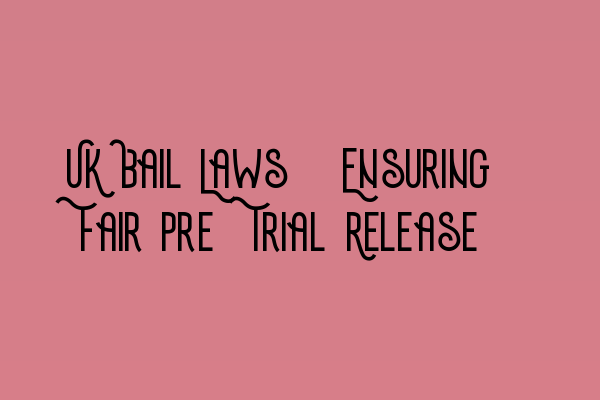UK Bail Laws: Ensuring Fair Pre-Trial Release
In the criminal justice system, the concept of innocent until proven guilty is fundamental. To uphold this principle, the UK has established bail laws that aim to ensure fair pre-trial release for individuals accused of a crime. Bail offers the opportunity for the accused to await trial in the community rather than being held in custody, provided they comply with certain conditions.
Understanding the legal framework surrounding bail is crucial for legal professionals, including aspiring criminal lawyers preparing for the SQE (Solicitors Qualifying Exam). If you’re studying for the SQE 1 exam, you can check out our SQE 1 Practice Exam Questions to assess your knowledge. For SQE 1 and SQE 2 preparation courses, SQE 1 Preparation Courses and SQE 2 Preparation Courses are available to help you excel.
The Importance of Bail
Bail plays a vital role in safeguarding the rights of the accused. It allows individuals to maintain their freedom and attend to various personal and professional responsibilities while awaiting trial. For those who pose no significant risk to society or the case, granting bail helps prevent unnecessary custody and potential associated harm.
However, the decision to grant bail is not without its complexities. It requires a careful assessment of several factors, including the seriousness of the alleged crime, the accused’s criminal history, ties to the community, and the likelihood of flight or interference with the legal process.
Mock exams can be highly beneficial for SQE candidates. If you’re looking to practice mocks for FLK1 and FLK2, consider our SQE 1 Practice Mocks FLK1 FLK2. Familiarizing yourself with the exam format and questions can significantly enhance your performance.
The Legal Framework
Under the UK legal system, the granting of bail is subject to specific legislative provisions and judicial considerations. The Bail Act 1976 outlines the criteria that courts must consider when assessing the appropriateness of granting bail.
The court’s primary concern is to prevent the risk of flight and ensure the accused’s appearance at trial. To achieve this, bail conditions may be imposed, such as surrendering their passport, reporting regularly to the police station, or providing a financial surety.
While advocating for the rights of the accused, the legal framework also recognizes the need to protect the public and victims. In certain cases, such as those involving violent offenses or substantial evidence tampering risks, the court may deny bail.
Potential Bail Law Reforms
Over the years, there have been ongoing discussions about potential reforms to the UK’s bail laws. Critics argue that the current system can be unfair, resulting in lengthy pre-trial detention for the accused, even when their risk of flight or interference is low.
Reform proposals often focus on reducing unnecessary pre-trial detention, streamlining the bail process, and ensuring greater consistency in decision-making. It is essential to strike a balance between protecting the public and upholding the rights and freedoms of the accused.
Stay updated with the latest SRA SQE exam dates to plan your preparation effectively. Knowing the exam schedule in advance can help you create a study plan that aligns with your exam date. Check out the SRA SQE Exam Dates to stay informed.
Ultimately, UK bail laws play a crucial role in ensuring fair pre-trial release while considering the rights of the accused and the safety of the public. As a future criminal lawyer, a strong understanding of bail laws is essential for providing effective legal representation and upholding the principles of justice.
If you’re looking for additional SQE study resources or guidance, SQE Criminal Law & Practice UK is here to support you on your journey. We offer a range of preparation courses and resources to help you succeed.
